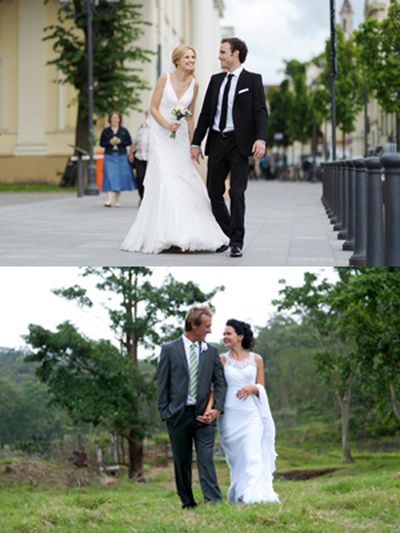A Tale of 2 Weddings
A city soirée or a fête on a the farm? Here’s how to decide the celebration style that’s right for you

A big city celebration has modern conveniences, while a country setting offers its own rustic chic charm. One thing is for sure, you want a personal backdrop for your big day. Here, wedding experts share insight to help you decide which setting is right for you.
The City Wedding
At the top of the list for why an urban wedding should win out? Practicality. First, you have your pick of venues, from traditional hotel ballrooms to modern museums and art galleries to hip converted warehouses, restaurants and more, all of which are likely practiced at working with big events. Many may even include everything from tables to lighting and the sound system with their venue fee or catering minimum.
Similarly, getting married in town enables access to numerous qualified vendors, allowing you to pick the caterer, florist, baker or DJs that best suit your needs, personality and budget, says Constance Curtis of Southern California-based Constance Curtis Events. There are no travel fees, delivery charges will be minimal if any, and competition may open the door to special packages, discounts or deals. Plus, it’s easy to meet with your vendors pre-wedding on a lunch break or after work if you need to hammer out centerpieces or sample the menu.
In addition, metropolitan weddings are über-convenient for guests, notes Curtis. Those who live close by don’t have to pay for lodging and may be able to use public transportation to avoid driving after a night of revelry. Out-of-towners can simply book a room upstairs from or within walking distance of your bash.
As for a city affair’s downsides, traffic takes the cake. You’ll also want to mention if any large events may impede public transport or clog the roads for drivers. And be sure to note parking garages near the venue, as you don’t want to walk down the aisle with half-empty rows because half your guests are driving around in circles looking for a spot.
More things to make you think twice: If you have chosen a major city, expect to pay a premium for all your vendors, and know that those venue fees and minimums don’t come cheap.
The Country Wedding
Whether you’ve got your heart set on saying your I do’s amid a field of flowers, at a vineyard or in a barn, a key advantage of having a country wedding is that there’s already gorgeous scenery to serve as the backdrop, says Maggie Lord, founder of RusticWeddingChic.com and author of “Rustic Wedding Chic” (Gibbs Smith, 2012). Although Lord notes that the often big, open spaces make it easy for you to create whatever atmosphere you want: elegantly Old-World, woodsy and sweet, a festive ranch hoedown, or a glamorous garden party with bocce ball and croquet. These settings typically have a ton of natural character, minimizing the need for extra embellishment. If there’s no onsite catering, you also can save money by bringing in your own alcohol, which is a great way to showcase your favorite local wineries, breweries and distilleries. And you’ll likely having the ceremony and reception in the same place, which means you won’t have to pay for two venues or transportation between sites.
But like any wedding, country destinations also have their concerns. Unless your location is an established wedding venue, everything from the table and chair rentals to creating a cooking space for the catering team to furnishing generators, lighting and portable bathrooms might be your responsibility, warns Lord, not to mention all the cleanup afterward. For this reason, even if you’re having a very informal event, Lord strongly advises hiring a wedding planner or day-of coordinator who can handle all the details, plan for contingencies and ensure everything runs smoothly.
Keep in mind that you’ll also have less local vendors to choose from, or will have to pay more for city-based vendors to travel or make deliveries to your locale, says Curtis. If it’s very remote, you’ll want to make sure there’s enough lodging for friends and family nearby, or organize transportation to get guests safely to and from town in a timely manner.